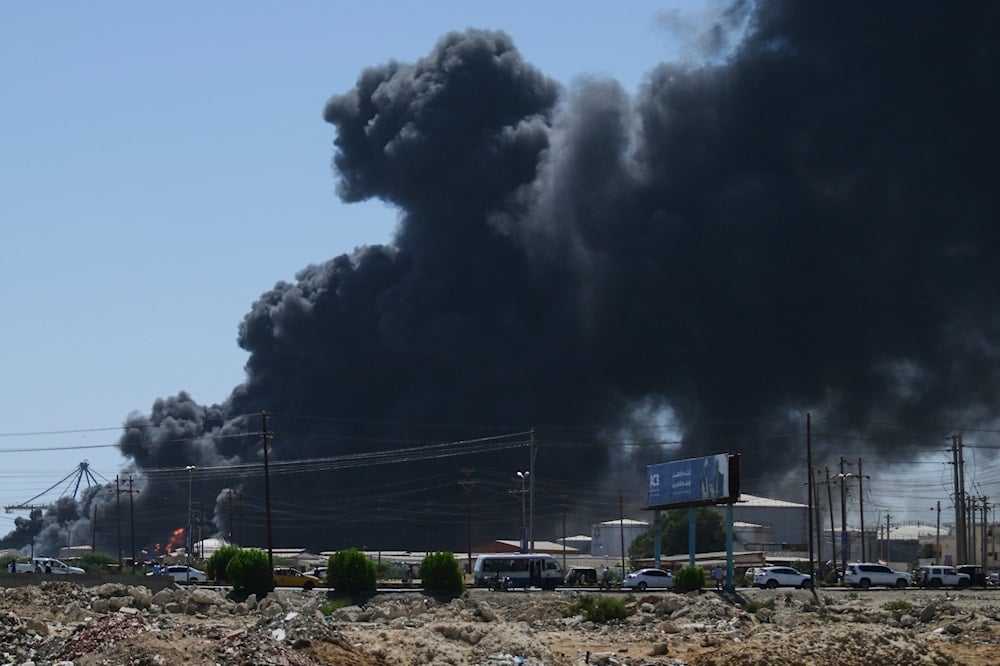RSF tighten El Fasher siege as Sudan risks fragmentation: Reuters
The Rapid Support Forces are closing in on El Fasher, the Sudanese army's last stronghold in Darfur, raising fears of ethnic violence, mass displacement, and a deepening civil war.
-

Smoke billows after drone strikes by the paramilitary Rapid Support Forces (RSF) targeted the northern port in the Red Sea city of Port Sudan, Sudan, May 6, 2025. (AP)
A Sudanese paramilitary force is now combating the final pockets of resistance in a Darfur city that has withstood a brutal 18-month siege, where a full victory would effectively cement a geographic partition of the country among the warring military factions, Reuters stated in a Monday report.
As the Rapid Support Forces advance, there are growing concerns, reported by Reuters, of potential reprisals against the estimated 250,000 people in El Fasher, the military's last foothold in western Darfur, and that the conflict could widen to other areas of Sudan.
Since the Rapid Support Forces announced on Sunday that they had taken control of the army’s headquarters in El Fasher, their fighters have been detaining fleeing civilians in nearby towns and villages, according to eyewitnesses and humanitarian and military sources cited by Reuters, while the International Organization for Migration reported that the fighting has displaced around 26,000 people.
Meanwhile, two Sudanese military sources said on Monday that thousands of soldiers from the army and former rebel groups allied with them were surrounded by Rapid Support Forces fighters after retreating into neighborhoods in western El Fasher.
The risk of division
US Presidential Adviser for Arab and African Affairs, Masad Boulos, stated in a press release that full control of Darfur by the Rapid Support Forces could have serious and troubling implications for the future, particularly regarding potential fragmentation.
Meanwhile, analysts noted that the RSF, which has been locked in a civil war with the army for more than two and a half years, might use its current momentum to try to reclaim territory elsewhere in Sudan.
If the latest US-brokered efforts to launch peace talks fail to make progress, the conflict could intensify further, deepening the famine, fueling more ethnic violence, and displacing millions of people.
The army had previously managed to drive the Rapid Support Forces out of the Sudanese capital, Khartoum, earlier this year. Still, according to Reuters, a military source and an RSF source said the militia has since stockpiled advanced weaponry, including long-range drones, which could enable it to attempt a comeback.
Possibility of further advances
Alan Boswell of the International Crisis Group said there has been no indication that the leadership of the Rapid Support Forces is content with controlling only western Sudan, and as long as they continue to receive sufficient supplies to sustain their war effort, it appears they intend to keep escalating the conflict.
Over the weekend, the Rapid Support Forces made gains in the strategic city of Bara in North Kordofan, putting them just a few hours away from Khartoum.
On Sunday, the group’s deputy commander, Abdel Rahim Dagalo, declared from the army’s base in El Fasher that their liberation of the city meant the liberation of all Sudan “up to Port Sudan,” adding that they were advancing with full force.
In a statement on Monday, the Rapid Support Forces said they would protect civilians in El Fasher and that humanitarian preparations were underway.
Civilians remain trapped
Two military sources and two local sources said the Rapid Support Forces appeared to be directing fleeing civilians toward towns surrounding El Fasher, where they reportedly planned to set up displacement camps.
Eyewitnesses who reached Tawila, a town to the east controlled by a neutral force that has taken in hundreds of thousands of people escaping the fighting, said they were instructed to walk to the nearby town of Jarni, where hundreds of others, including women and children, remain detained by RSF fighters.
Activists have also warned of possible revenge attacks on civilians from the Zaghawa tribe following the intense battles over control of the city, similar to what occurred earlier in the Zamzam displacement camp to the south.
On Sunday, RSF officials released videos claiming they were providing safe passage for former fighters, though other footage shared by activists appeared to show RSF members shooting unarmed men and chanting over their bodies.

 4 Min Read
4 Min Read










